- Home
- Gail Carriger
Prudence Page 11
Prudence Read online
Page 11
“We’re always prepared for that.” In an aside Rue was probably meant to hear, Aggie added, “Imbecile.”
Rue gritted her teeth and tried to think of sticky sweet buns. “Very good. Thank you for your efficiency.”
Before Aggie could add anything more snide, Rue replaced the tube.
“I could grow to hate that woman,” she said to Primrose.
Prim patted her back condescendingly. “You handled it well – bad language never won fair maiden.”
“Prim, dear, I don’t think that’s how the saying goes. Nor do I think Phinkerlington would like being called a fair maiden.”
Prim grinned. “Precisely my point.”
The decklings scrambled to bring in the sail. Rue watched, plotting how to run speed drills. Also, they’d benefit from one among them being put in charge of the others for the sake of efficiency – there seemed to be a lot of squabbling. One of the deckhands was supposed to have them under orders, but he seemed at a loss coping with an overabundance of youthful exuberance. An internal hierarchy might work to everyone’s advantage.
By the time the mainsail was down, they were almost upon the beacon.
“Professor Tunstell, three, two, one, mark,” Rue said, trying not to sound panicked.
The Spotted Custard sank as Percy activated the anti-puffer. Rue’s stomach went up into her throat. It was rather like bobbing on a large wave. They slid through the Charybdis currents easily this time, but unfortunately hit a strong current below that dragged the airship westward away from the beacon.
“Again, professor,” ordered Rue.
Down they bobbed a second time. And a third. And a fourth in quick succession. This was followed by a buffeting spin through another set of fiercer Charybdis currents. Then they were blessedly out. The aether mists cleared and they were floating down through a star-filled sky. Rue wondered, not for the first time, what the aetherosphere looked like from above. And what, in fact, the layer above the aetherosphere was made of – was it even breathable? She was not alone in this curiosity – aether scientists discussed the outersphere as if it were a desirable undiscovered country, and were always concocting new ways to go higher. So far, however, no one had managed to break through.
Percy cranked up the propeller, and The Spotted Custard farted excitedly. Slowly, they swung around to face their original direction of travel, and before them, under the silvered moon, was the upper docking section of the Maltese Tower, the beacon rising above into the aetherosphere.
Rue scurried to the front rail of the forecastle, looking out over the bowsprit at the Sixth Pinnacle of the Modern Age.
The Maltese Tower, one of the Eight Wonders of the British Empire, was as impressive as one might hope. It looked like nothing so much as an immense piece of elaborate cooking equipment – a massive circular oven pot with peepholes and windows and multiple spatulas sticking up and out, only facing the wrong way with their handles in. These spatulas made up the docking ports, a few already boasted dirigibles, ornithopers, and other airships, fresh into port, mooring ropes out. Some were under maintenance, while others were taking on helium, water, or coal. The tiny forms of dock workers scampered along the spatulas like ants along cake servers. The dock of the Maltese Tower resembled a shipyard, only miles up in the air. Not, of course, that Lady Prudence should have any idea what a shipyard looked like.
Rue wasn’t impressed because what made the Maltese Tower one of the Eight Wonders of the British Empire wasn’t its beacon, nor its docking port, but its bottom half.
For when one looked down, it was as if the Maltese Tower kept going for ever, braced and supported by scaffolding so colossal it required most of the island of Malta as its base. This part also looked like an endless stack of kitchen utensils. It was held up not by its own structure, but by hot-air balloons staged all along in a random pattern, balloons that were moved by the winds so that the whole tower swayed one way and then the other under the influence of various breezes. Like some underwater sea worm meets jumble sale.
It must be terribly troublesome in a storm, thought Rue.
The Maltese Tower seemed to have been built with any available material: fabric and net, wood and steel, a massive bicycle here, bits of boat there, very small houses, the occasional train carriage. Rue knew people lived and worked up and down the tower, an entire culture sustained by aetheric travel, but she was hard-pressed to think it wondrous.
Prim came to stand next to her. “Gracious me! It is hideous, isn’t it?”
“Oh, I don’t know.” Rue was disposed to be optimistic. “If one squints, it might be called attractively biological. See those parts, dangling. They are like seed pods.”
“Presumably they’re actually habitations and workshops.”
Rue ignored her friend’s lack of romantic vision. “The balloons and air tanks there are like leaves stretching upward.”
“I don’t follow.”
“No, you never do.” Rue was resigned. Primrose was a creature of practical elegance and the Maltese Tower was neither.
They watched as enormous dumb waiters, carrying coal, moved sedately up one side of the tower on thick cables. There were long tubes winding around and sucking up water from the Mediterranean, filtering and siphoning, destined for the great ships that docked far above but tapped all the way along by workers and inhabitants. Rue remembered reading somewhere that the Maltese Tower had a dedicated side business in the salt trade.
Percy guided The Spotted Custard forward gingerly, heading for a port on the nearside. The Custard seemed to be going rather fast.
“I should prefer it, professor, if we didn’t actually crash into the Maltese Tower,” said Rue.
“Yes, captain, I guessed as much.”
The Spotted Custard sped up as she caught a breeze.
“Percy!” said Rue, voice rising.
“Everything is in order, captain.”
Rue lifted the speaking tube. “Cut the boilers, please.”
“Anything for you, mon petit chou,” Quesnel’s warm voice acknowledged the command. Rue was decidedly relieved it wasn’t Aggie.
She added, “Once we’re docked, please come up for a discussion on the matter of shore leave.”
“It would be my pleasure,” replied Quesnel.
Rue replaced the tube with the feeling that her engineering staff was doomed to be a problem, one way or another.
Percy toggled the switch that reversed the propeller to the sound of triple flatulence. The Spotted Custard stuttered, jerking to a slower speed, almost sedate. They glided in and nosed up next to one of the spatulas, subsiding into stillness with one final tremendous ptttttt noise.
“Not the most dignified of arrivals,” commented Primrose.
Percy snipped at his sister: “I thought the point was not to crash.”
“You did very well, Percy, on that front. And I would appreciate it if you were consistent in this matter,” praised Rue.
Percy looked at her sideways to see if she were humouring him and then subsided onto a nearby deck-chair in a funk.
Quesnel appeared above deck mere moments later. The ubiquitous smudges gave him a rakish look which Rue wished didn’t suit him quite so much. It was horribly annoying of him to look dashing. She ignored his smudgy adorableness. He cocked his head at her engagingly.
With Prim and Percy already close at hand, Rue called the meeting to order. “Let everyone under you know, please, that we will be departing from the tower in exactly one hour. Staff and crew are allowed to explore, but they’d better be back in time. Of course, security measures must be taken to protect the Custard, so half the personnel for each station must remain behind. I don’t care how you make the decision of who’s allowed leave but you had better make it fast. Also, one of our command chain should remained behind.”
Not unexpectedly Percy said, “I’ll stay.”
“Of course you will,” said Quesnel, “but that hardly improves security.” He didn’t await Percy’s rebuttal,
instead lifting the speaking tube to engineering. “Aggie? Draw lots for shore leave. Three-quarters of an hour only, so pick a few with pocket watches. What? No, I don’t care if you use it as a reward. Why, has Spoo been acting up again? Well, if you don’t like the chit, reassign her, for goodness’ sake. I’m sure they could use the help on deck. Yes, yes, very good. Of course you have to stay – who else will make certain we take on the right amount of coal and water? Yes, well, that’s the way it is.” He put the tube down. “Sometimes, that woman!”
Rue looked at him in genuine surprise. “Only sometimes?”
Prim bustled off to consult the head steward and cook to determine who might be allowed off-ship and what supplies they required. She returned shortly, having somehow found the time to change into a walking suit of black taffeta with a pattern of embroidered rings in gold and burgundy. She wore a matching black hat perched forward on her head, decorated in gold braid and tufts of burgundy feathers and carried a black parasol.
“Very nice,” Rue said enviously.
“Thank you.” Primrose twirled for full effect. “Queen Mums chose this one as my shore-leave-expedition-and-visiting-over-curry outfit. She has odd notions about Indian foodstuffs, my Mums. I think she was traumatised during her own travels.”
Rue nodded. “Should I change?” Primrose was always wise in the matters of attire.
Primrose gave her a critical once-over. “No, I don’t think it necessary.”
Rue puffed under the praise. She couldn’t help it – Prim was just so elegant, it was nice to garner approval from her. “Shall we, then?”
The ladies linked arms and, without further ado, left the ship. Percy took that as permission to retreat to his library leaving Virgil at the helm. Quesnel, after a moment, strode after Rue and Prim. Rue peeked over her shoulder to see him making hasty repairs to his smudges with a large white handkerchief. She mourned the loss, and then reprimanded herself for it.
The two young ladies made their way along the long spatula handle towards the centre of the docking port. The whole tower was illuminated via a variety of artificial sources, from gas chandeliers and tubes of glowing orange fog to massive brightly coloured paper lanterns. Since they were clearly women of some standing, the dockworkers parted before them by rote. A few snide remarks were muttered as they passed but Rue and Prim stuck their noses in the air and pretended not to hear. Quesnel followed a few steps behind, eyes wary. The workers were mainly intent upon The Spotted Custard, dragging pipes, carts of fuel, and other necessities towards it.
Rue frowned, watching as the supply lines targeted her ship. The Spotted Custard didn’t require all that much. “I haven’t signed off on any of this. Where’s the tower steward?”
Only then did she register the fact that a group of her own staff and crew – including sooties, greasers, firemen, deckhands, decklings, stewards, and scullery maids – trailed in their wake like school children out for a jaunt in the park. It was an odd spectacle and made Prim and Rue, at the head of the procession, feel suddenly conspicuous.
Rue became aware of a new kind of bustling. The workers parted before her to reveal an officious elderly gentlemen wearing full evening attire and a red sash across his breast like a military general. He held a leather ledger and a long double-ended stylus. He was using both, rather indiscriminately and not as designed, on any dockworkers who did not get out of his way quickly. “Bad minion!” he shouted at one boy, snapping the lad’s ear with the stylus.
Behind him stomped two men in uniform guiding between them a steam-powered tea trolley loaded with devices, boxes, aetherographic transmitting slates, and other necessities of bureaucracy. Rue thought it a grave misuse of a perfectly nice tea trolley.
The man with the sash stopped, snapped his heels together, and stood to attention, blocking their path. He looked Rue and Prim up and down and then turned to Quesnel, dismissing the ladies as mere fripperies.
“Your ship, sir?” he asked without introduction. “Travelling gypsy barge? Circus troupe? I don’t have anything in the annals expected for today under entertainment or ladybird.”
Quesnel gave him a funny look. “Her ship, sir,” he said, tilting his head at Rue, emphasising the sir as a marker of the lack of proper conversational approach.
The little man’s eyebrows went up but he turned to Prim and Rue. They were quite the pair, parasols closed and masquerading as walking sticks, hats tilted forward although there was no need for shade, arms linked, expressions disapproving. Rue carried her mother’s parasol, which was too ugly to match any of her outfits, but was more sturdy than any of her fashionable ones. This one, felt Rue, could really cause damage to a noggin if applied with enough enthusiasm. Somehow this made her feel more secure about life in general.
The ladies regarded the man with eyes of steely disinterest. Well, to be fair, Prim’s eyes were more a melted cocoa of mock reproach, and Rue’s were the twinkling tawny of barely contained amusement. But it was hard to see this fact through the hats. Rue spared a moment to wonder if Aunt Ivy’s insistence on hats wasn’t a precaution against sub-par acting abilities.
Rue adjusted hers to a steeper angle, the better to hide her twinkle.
The officious man cleared his throat as though expecting them to speak first.
They continued looking at him in silence.
Rue up-tilted her nose in the air, and drew her shoulders back, using physicality to grow more aristocratic. Prim didn’t need any help – such things came naturally to her.
Finally, the man bowed. “Senior Tower Jerquer, Gresham Stukely at your service.”
“Mr Stukely,” said Rue and Prim in chorus, curtseying.
“Your, erm, ship, ladies, it’s not in my registry. That’s illegal docking, add to that non-notification, add to that unauthorised personnel, add to that after-hours fees, add to that––”
“Oh dear me,” said Rue to Prim. “Daddy promised, didn’t he, that she would be on everyone’s books? How terribly upsetting. He promised!” Rue spun her ugly parasol against the metal walkway in agitation. She channelled the most snobbish of Dama’s drones in her voice – enunciating all her vowels as though hampered by particularly large teeth.
Prim instantly fell into the game. “Yes, he most certainly did. Silly Daddy. Oh sister, what are we to do?” Her voice wobbled in distress.
Rue admired this greatly – Prim was very good at being distraught. Rue’s forte was bluster, a native ability inherited from her blood parents, so she went with that. “Did he give us paperwork to that effect? I simply cannot remember. You know I’m terrible with anything of the notation inclination.” She turned to the official, batting her eyelashes, and reached for the part of her that could talk like Dama at his most supercilious. “Just a little world tour, you understand? Of course you do. You have a very understanding brow. Daddy thinks we need culture. Of course, we had to come here first. The Maltese Tower is the last word on culture. Poor Daddy couldn’t come, sadly bedridden. It’s the aetheric particles – they caused him to come over all flopsy. But he did say it was settled. I’m sure he did say that. Or was that Mr Barclay? You know Mr Barclay, don’t you, Mr Stukely? Oh, you must – everyone who is anyone knows Mr Barclay the banker?” When all else failed – overwhelm with inanities.
Prim widened her big brown eyes in distress. “Oh, sister, this is terrible, so terrible! What are we to do? Oh, no, are we going to be detained, or questioned, or searched, or…?” She trailed off, looking as though she might cry. “I feel faint. Where’s my sal volatile? We won’t be locked away, will we? I don’t think I could stand it, not a small bare room. No trim at all.”
Rue put an arm about Prim in a sisterly manner, hushing and comforting her. “I’m certain this nice gentlemen will help us, won’t you, kind Mr Stukely? My sister, you understand, is delicate. Très, très easily overcome by nerves. Poor dear sister.”
The jerquer was himself overcome with remorse and the need to be a hero to such obviously innocent and, more
importantly, wealthy young women. “Oh, now, ladies, normally an unregistered craft, well, we would have to at least question––”
Primrose began to sob. One fat tear dripped down her perfect rosy cheek. Rue suppressed the urge to clap.
Quesnel watched this entire exhibition with a well-hidden grin. He was not, Rue noticed, employing his hat, but had merely sunk his chin down into the high points of his collar and cravat in the manner of an undertaker.
Mr Stukely twitched at Prim’s whimpers. “Perhaps, just this once, a small fine? It is a very nice craft, very colourful, obviously not unlawful with such carefree decorations.” He glanced over at The Spotted Custard, deluded by the bright black on red spots into disregarding its smooth deadly lines.
Rue compressed her lips. This was, of course, part of her intent with the Custard’s decoration. If Dama had taught her nothing else, it was that the outrageous was often one’s best disguise. It is a very great thing, my Puggle, not to be taken seriously, he had once said. If two young ladies of high society showed up on one’s tower claiming a pleasure tour, it was more believable if their dirigible looked like an enormous, friendly beetle.
Rue latched on to the little man’s last words. “Remuneration for your troubles, did you say, my dear Mr Stukely? How kind you are. How very kind. How much did you say? Not that a lady should talk such details but, as you see, we are currently without our abigail.”
The little man cleared his throat, flushing red, and then, so he would not have to mention the number out loud, scribbled it down with the stylus on a corner of his ledger and showed it to Rue. Rue took note of the amount, as well as the details and rosters of the other ships in dock, helpfully listed on that very ledger. There were no familiar names.
Without flinching, she reached into her reticule and extracted the sum in question, handing over the coins. Pittance indeed – she did not even need a banknote. Which was a good thing, as it would not have been drawn on Barclay’s.
The jerquer carefully counted, noting that the sum was well over the requested amount, over by enough for it not to be a mistake. He pocketed the excess with alacrity and instantly became their good friend. “Ah, thank you very much, ladies. And a very good afternoon to you, Miss…?” He trailed off.

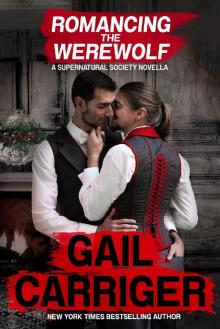 Romancing the Werewolf
Romancing the Werewolf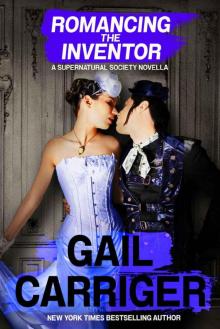 Romancing the Inventor
Romancing the Inventor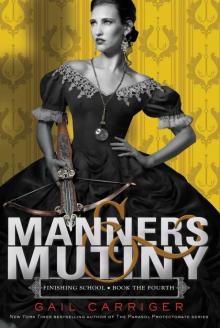 Manners & Mutiny
Manners & Mutiny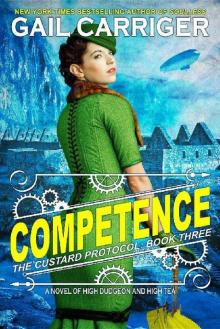 Competence
Competence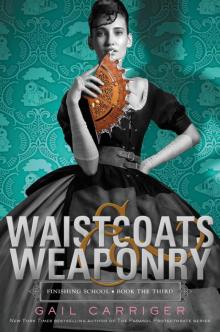 Waistcoats & Weaponry
Waistcoats & Weaponry Changeless
Changeless Blameless
Blameless Soulless
Soulless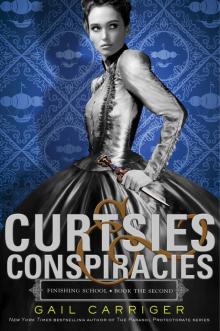 Curtsies & Conspiracies
Curtsies & Conspiracies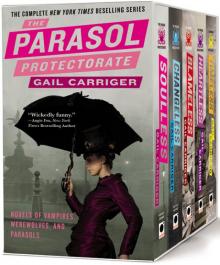 The Parasol Protectorate Boxed Set
The Parasol Protectorate Boxed Set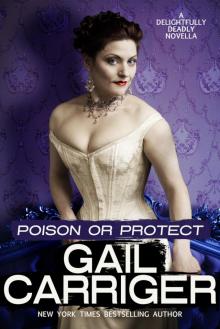 D2D_Poison or Protect
D2D_Poison or Protect Funny Fantasy
Funny Fantasy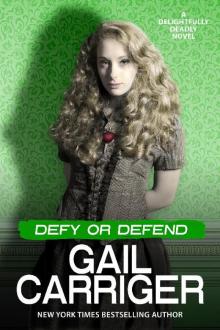 Defy or Defend
Defy or Defend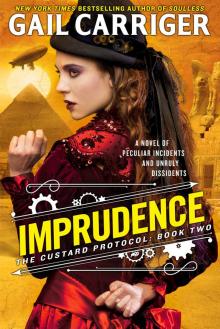 Imprudence
Imprudence Reticence
Reticence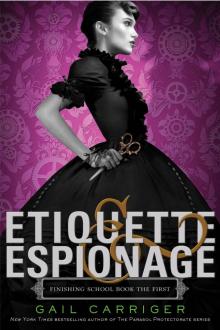 Etiquette & Espionage
Etiquette & Espionage Heartless
Heartless Prudence
Prudence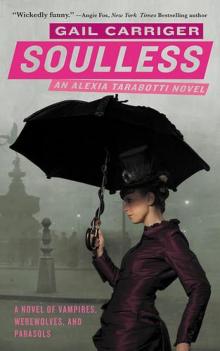 Parasol Protectorate 01 - Soulless
Parasol Protectorate 01 - Soulless Fairy Debt
Fairy Debt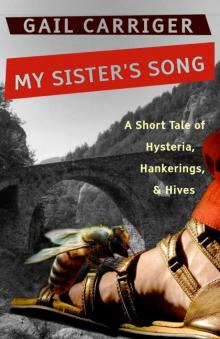 My Sister's Song
My Sister's Song Changeless: The Parasol Protectorate: Book the Second
Changeless: The Parasol Protectorate: Book the Second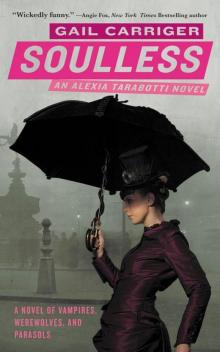 Soulless: The Parasol Protectorate: Book the First
Soulless: The Parasol Protectorate: Book the First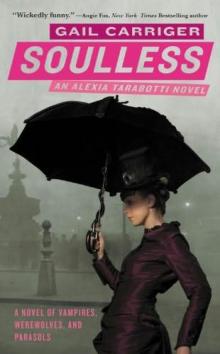 Soulless pp-1
Soulless pp-1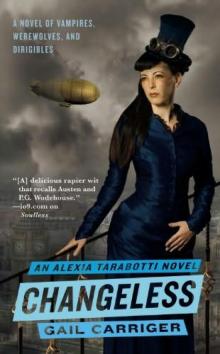 Changeless pp-2
Changeless pp-2 Heartless: The Parasol Protectorate: Book the Fourth
Heartless: The Parasol Protectorate: Book the Fourth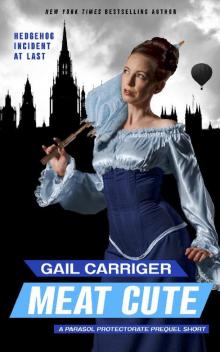 Meat Cute
Meat Cute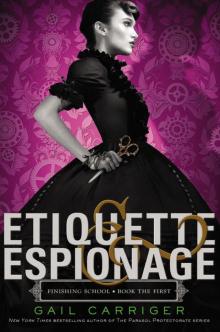 Etiquette & Espionage (Finishing School)
Etiquette & Espionage (Finishing School)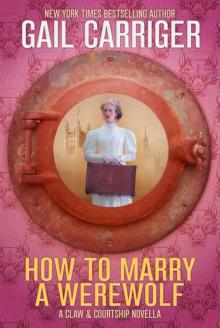 How To Marry A Werewolf (Claw & Courtship Novella Book 1)
How To Marry A Werewolf (Claw & Courtship Novella Book 1)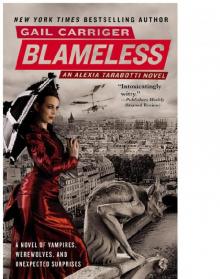 Blameless: The Parasol Protectorate: Book the Third
Blameless: The Parasol Protectorate: Book the Third Heartless pp-4
Heartless pp-4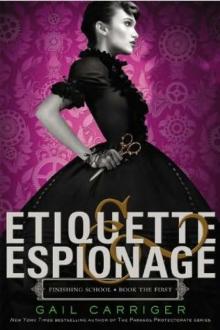 Etiquette & Espionage fs-1
Etiquette & Espionage fs-1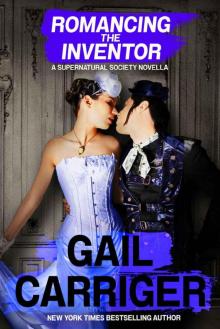 Romancing the Inventor: A Supernatural Society Novella
Romancing the Inventor: A Supernatural Society Novella Curtsies & Conspiracies fs-2
Curtsies & Conspiracies fs-2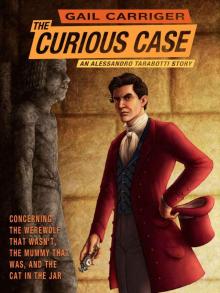 The Curious Case of the Werewolf That Wasn't, the Mummy That Was, and the Cat in the Jar (The Parasol Protectorate Book 6)
The Curious Case of the Werewolf That Wasn't, the Mummy That Was, and the Cat in the Jar (The Parasol Protectorate Book 6)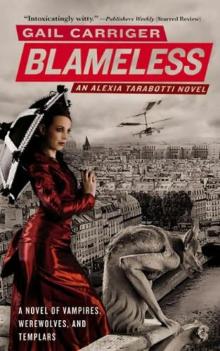 Blameless pp-3
Blameless pp-3